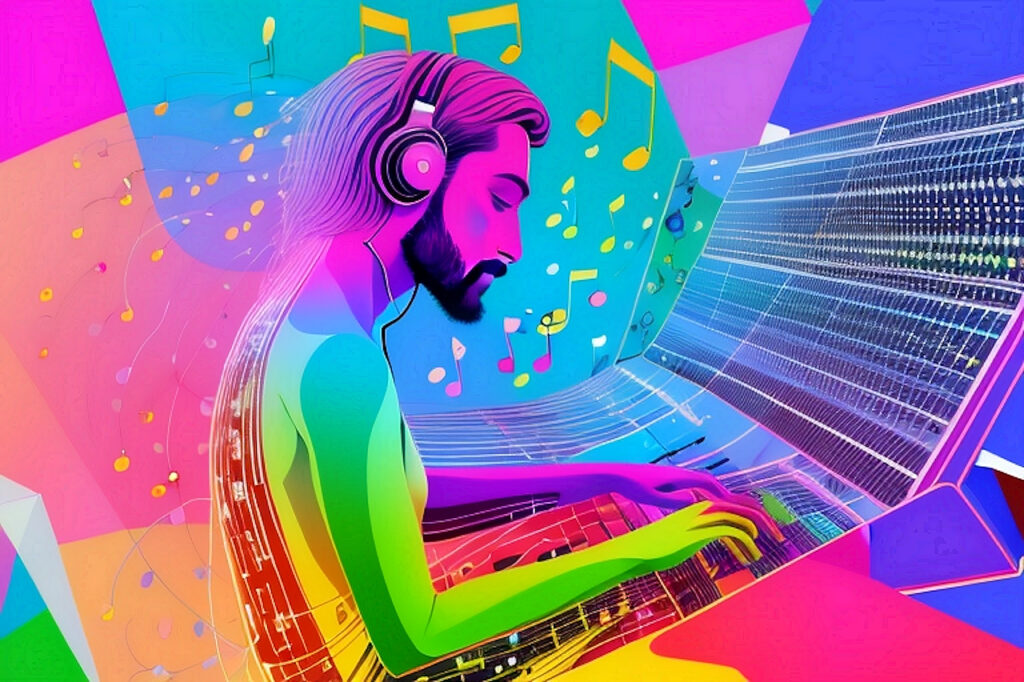
AI music creation, also known as AI music generation or AI music composition, is a rapidly emerging field in the music industry.
Advancements in artificial intelligence have paved the way for groundbreaking technologies that are revolutionizing how music is created, composed, and produced.
With the introduction of AI music software and tools, the future of the music industry looks promisingly innovative and dynamic.
Article Topics.
ToggleMachine learning music.
AI music creation involves machine learning algorithms and deep neural networks to generate music autonomously. These algorithms are trained on vast amounts of existing music data, enabling them to learn patterns, structures, and styles.
By analyzing and understanding these patterns, AI algorithms can create original musical compositions that closely resemble the works of human composers.
Different genres.
One of the significant advantages of AI music creation is its ability to generate music across various genres and styles effortlessly.
From classical symphonies to modern hip-hop beats, AI algorithms can adapt and compose music in any desired style. This versatility opens up countless possibilities for artists, composers, and producers who can now experiment with new genres and blend different styles seamlessly.
AI music software and tools.
AI music software and tools have also become indispensable in the music production process.
These tools can assist musicians by providing intelligent suggestions for chord progressions, melody enhancements, and harmonization. This streamlines the creative process, allowing artists to focus more on their musical expression while the AI software handles the technical aspects.
AI music software can also help musicians with complex tasks such as transcribing and arranging sheet music, making collaboration between artists more efficient and seamless
New companies.
The AI music industry is rapidly growing, with a wide range of companies and startups dedicated to developing innovative AI music software and tools.
These companies are constantly pushing boundaries and introducing new technologies that enhance the creative process for musicians and revolutionize the music industry as a whole.
As AI technology evolves, we can expect to see more sophisticated AI music tools that allow for even greater creativity and personalization.
Ethical concerns.
However, the integration of AI in music creation also raises concerns and challenges.
Critics argue that relying too heavily on AI-generated music may stifle creativity and diminish the role of human composers. Furthermore, there are ethical implications regarding the ownership and copyright of AI-generated music.
As AI technology advances, it is crucial to navigate these issues carefully and ensure that human creativity remains at the forefront.
Future trends.
AI music creation is poised to reshape the music industry in profound ways, ushering in an era of unprecedented creativity and innovation.
As AI technology continues to advance, we can anticipate the emergence of groundbreaking applications that will transform the way music is created, consumed, and experienced.
Personalized music experience.
One of the most exciting trends in AI music is the development of personalized music experiences.
AI algorithms will analyze individual preferences and listening habits to curate personalized playlists, suggest new artists, and even generate music tailored to specific moods and activities.
This level of personalization will revolutionize the way we interact with music, fostering a deeper connection between listeners and the music they love.
Music creation made easier.
AI will also play a pivotal role in enhancing the accessibility of music creation. AI-powered tools will empower individuals with little or no musical training to create their music, democratizing the creative process and making music production accessible to all.
This democratization will lead to an explosion of musical creativity, giving rise to new genres, styles, and artists that would never have emerged in a world without AI.
Live music transformed.
AI will revolutionize the live music experience.
AI-powered systems will analyze audience reactions and adapt performances in real time, creating a more immersive and interactive experience for concertgoers. Imagine attending a concert where the lighting, stage effects, and even the setlist are dynamically adjusted based on the crowd’s response.
Musical transformation.
AI will transform live music into a truly participatory experience, blurring the lines between performers and audience.
As AI technology continues to evolve, the boundaries of music creation and consumption will be further expanded. AI music will become ubiquitous, seamlessly integrated into our daily lives, from the music we listen to while working out to the soundscapes that enhance our gaming experiences.
AI will not only create new music but also redefine the way we interact with it, shaping the soundscape of tomorrow.
AI Music Creation Toolbox.
Here are some AI music creation software that you might want to try to flex your creative imagination. It is amazing what you can produce and adapt to your tastes and interests.
Visit – Splashmusic
Visit – TryMusicFlow
Visit – Chordai
There are affiliate links in this article. So if you click on a link and make a purchase after landing on the seller’s site, your price will be exactly the same as if you landed on their site through any other means. The only difference is that AI Product News receives an affiliate commission paid by the seller – never by you. This helps us to stay healthy, wealthy (not really) and wise!!

